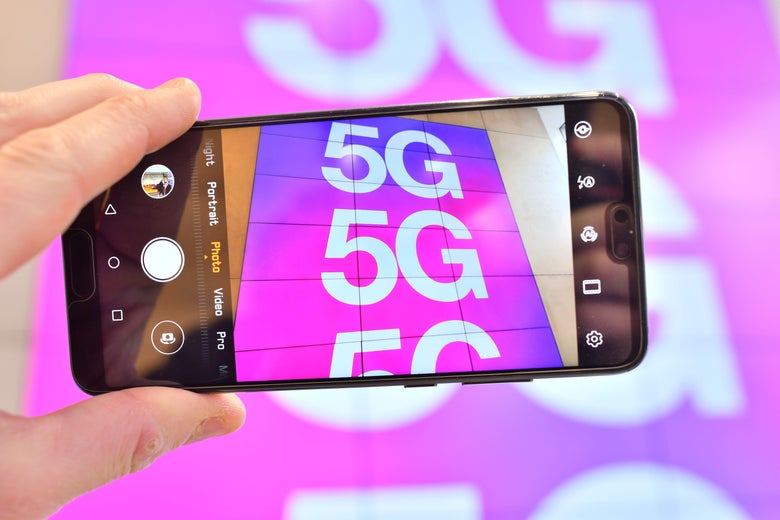
A person poses holding a mobile telephone the camera showing a sign advertising 5G mobile telecommunication in a shop in London on Jan. 28, 2020.
JUSTIN TALLIS/Getty Images
The U.K. announced Tuesday that it will allow Chinese tech firm Huawei to continue to help build the country’s 5G wireless network despite heavy pressure from the Trump administration to bar the company on national security grounds. Huawei’s ties to the Chinese government have caused concern among American lawmakers who see the company as ultimately controlled by Beijing, making it a potential state security threat. Despite classifying the company a “high-risk vender,” the British government said it would go ahead using Huawei equipment, but with some restrictions. The company’s products will not be allowed to be used in the network’s core, the most sensitive portion of the telecommunications grid. It will also limit the use of Huawei equipment in the network’s periphery to 35 percent of the system. The Chinese products will also be barred from use near sensitive sites, such as military bases and nuclear sites.
In building out its 5G network, the U.K. found itself under intense political pressure from all sides. Along with U.S. pressure, which included threats that allowing Huawei to be involved could jeopardize Britain’s central role in the “five eyes” intelligence-sharing group, London faced threats from Beijing that banning the company would result in “substantial” repercussions in Chinese trade and investment plans with the U.K. Such a political and economic tug-of-war comes at a particularly uncertain time for the U.K. as it leaves the European Union. With little leverage, the country is awkwardly relying on brokering new trade deals with both countries to offset potential losses from European trade. British Prime Minister Boris Johnson frequently used a new American trade deal as a talking point in his final push to dislodge the country from the EU and a key pillar of the U.K.’s future economic plan.
Despite the warnings and potential fallout, British officials told the Guardian they felt they needed the Chinese technology to stay on schedule to complete the network and that there were few viable alternatives in the marketplace to Huawei. “Officials feared banning the provider could have delayed 5G rollout by two to three years, increased the cost to consumers–and dented economic growth,” the Guardian reports. One official said a “‘market failure’ meant there was little alternative in the short term.” Beyond Huawei, the BBC notes, the U.K. currently relies on four companies: Nokia, a Finnish company, Ericsson of Sweden, South Korean company Samsung, and ZTE a Chinese company that is partially owned by the Chinese government.
The U.S. has argued that allowing Huawei in, even on the periphery, opens the door to potential Chinese meddling down the road. “The Trump administration’s cyber-security chiefs, along with their Australian counterparts, contend that over time the ‘edge’—the name given to the boundary between the core and periphery—will disappear, as more and more sensitive operations are carried out closer to users,” according to the BBC. “As a result, they claim it will no longer be possible to keep Huawei, and by extension the Chinese state, out of the network’s most sensitive areas.”
from Slate Magazine https://ift.tt/2uIaMEk
via IFTTT
沒有留言:
張貼留言